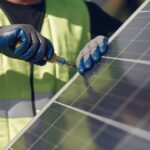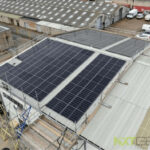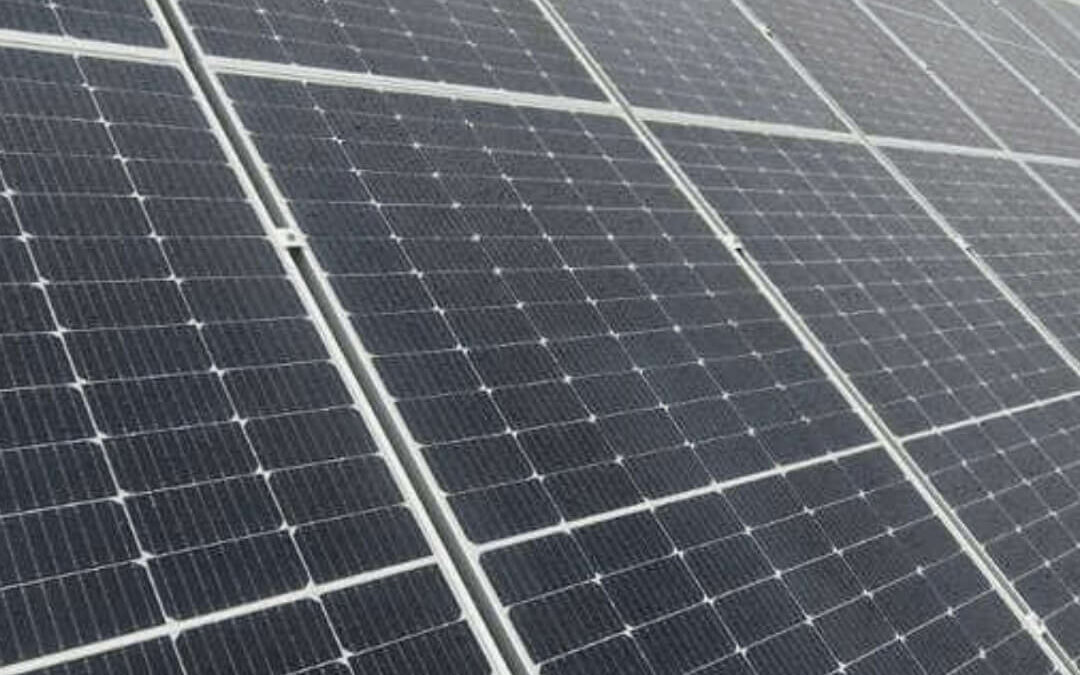


There is currently no maximum number of solar panels you’re allowed to have in the UK
Any solar PV system installation above 3.68kWp must have permission beforehand (DNO G99)
Buying an oversized solar PV system is less cost-effective and will produce energy you don’t use
Solar panels are becoming more affordable, while electricity bills remain high. You might be wondering what the maximum number of solar panels you can install on your property is, whether that is on the roof of your house, garage or shed, in your garden or on land that you own.
This blog post will help you understand the legal restrictions on the number of solar panels you can have, the size of your solar panel system, and the disadvantages of having a large solar array.
If you are interested in going solar, you can contact us for a free no-obligation quote using the contact form at the bottom of the page or you can call us at NXTGEN Energy on 01268 928 690.
Understanding Maximum Number of Solar Panels
Is there a maximum number of solar panels you can have?
The maximum number of solar panels you can install is unlimited, as long as you have enough space for them. You can fill up your roof, your garden or your land with as many solar panels as you can fit, even if you have a lot of acres of land.
It should be noted that even though a roof can hold a certain amount of solar panels, they should only be placed on certain roof areas to ensure they get enough daylight to generate the maximum solar energy efficiently.
The only thing you need to do is to ensure that your solar panels are installed safely, connected correctly to your power supply and the National Grid, located entirely on your property, and follow any local planning permission rules.
There is currently no rule, regulation or law in the UK that limits the number of solar panels you can have.
Is there a maximum amount of solar energy you can produce?
You can produce as much solar energy as you want, but you need to let your Distribution Network Operator (DNO) know if you plan to install a system with more than 3.68 kWp of peak power capacity per phase.
Most homes in the UK have a single-phase electricity supply, which means they need to get approval for any solar PV system above 3.68kWp (Kilowatt Peak which is the amount of power produced under standard laboratory test conditions, which broadly equate to bright sunshine. So a 3.68kWp solar PV system will produce 3.68kW of electrical power in bright sunshine).
UK homes or businesses with a three-phase electricity supply can install up to 11.04kWp without prior approval, as they have 3.68kWp for each phase (3.68kWp per phase x 3 = 11.04kWp).
If you want to upgrade your UK home from a single-phase electricity supply to a three-phase electricity supply, it will cost you between £8,500 and £10,000.
Getting approval from your Distribution Network Operator (DNO) is not a big deal. Systems under 5kWp are usually approved without any problems quickly, although this year there has been some delays due to the increased numbers of homes getting solar PV systems installed in the UK as the price of solar panels continues to drop and they become more efficient.
Systems above 5kWp may need some extra safety checks, but they are still likely to be approved, although it may take some time, which is normally a few weeks.
How many solar panels can the average roof hold?
An average sized 3-bedroom house in the UK has enough roof space for about 20 solar panels.
The roof area of this kind of house is usually about 70 m², which can fit four solar panels in each of the five rows.
Each solar panel is about 2 m² in size, but there has to be some space between them and the roof edge, and between each row. This is because the installer has to follow the legal requirement of leaving 20 cm of space around the panels, and also because the panels need 15 cm of space between the rows to adjust to the temperature changes throughout the year.
The weight of the solar panels is not a problem for UK roofs, as they can hold much more than the panels need. The average solar panel needs only 8.6 kg per square metre, while our roofs can support at least 108 kg per square metre.
How many solar panels should you have?
An average 3-bedroom home should install 12 solar panels, based on the average electricity consumption and solar usage of UK households. This means that the home uses about 2,700 kWh of electricity per year, and 50% of it comes from solar energy.
A smaller home with one bedroom should have eight solar panels, while a larger home with four or five bedrooms should have 16 solar panels, but your installer will calculate the amount of solar panels you need based upon your energy usage throughout the year and the roof space available to make sure you don’t produce more solar energy than you can use.
Are there downsides to large solar panel systems?
Large solar panel systems have no drawbacks, except for the initial cost. But you need to make sure that the solar PV system matches your electricity needs.
If your electricity consumption is high – for example, more than 4,000 kWh per year – you can save hundreds of pounds on your energy bills every year with solar panels.
But if you get a solar panel system that generates much more electricity than you can use, it will take longer for you to recover your initial investment.
You will still earn money by selling your surplus energy back to the National Grid, through the Smart Export Guarantee (SEG) scheme, but you will probably get less than what you pay the National Grid for electricity.
This means that for every extra solar panel you install beyond the optimal number for your home, you will need 0.4 years more to break even, on average.
Conclusion
You have learned the maximum number of solar panels you can install in the UK and the related information you need. The next step is to go solar and start saving money on your energy bills and beat the energy price rises in the UK.
Feeling motivated and ready to get a free no-obligation quote for a solar PV system? Want to learn more? Your best option is to talk to one of our friendly solar energy experts on 01268 928 690 or click on the button below and we will help you find the right solar PV system for your home and budget.
Frequently Asked Questions about Maximum Number of Solar Panels
Latest Solar Panel Installation Posts
- UK Schools and Hospitals to Receive £180 Million Solar Investment
 Solar Investment: The UK government, through Great British Energy, is investing £180 million to install solar panels on 200 schools and 200 hospitals as part of its net-zero carbon strategy. Benefits: This initiative aims to cut energy costs, reduce carbon emissions, and enhance energy security by reducing reliance on imported fossil fuels. … Read more: UK Schools and Hospitals to Receive £180 Million Solar Investment
Solar Investment: The UK government, through Great British Energy, is investing £180 million to install solar panels on 200 schools and 200 hospitals as part of its net-zero carbon strategy. Benefits: This initiative aims to cut energy costs, reduce carbon emissions, and enhance energy security by reducing reliance on imported fossil fuels. … Read more: UK Schools and Hospitals to Receive £180 Million Solar Investment - How SolaSkirt Can Protect Your Solar Panels
 Pigeon Issues: Pigeons under solar panels damage cables, leave guano, spread disease & create noise. SolaSkirt Fix: Aluminium barrier that blocks pigeons, enhances panel look, and installs without damage. Top Benefits: Durable, weatherproof, maintenance-free, and improves aesthetics & efficiency of panels. Cost-Saving: An affordable pigeon proofing solution that prevents expensive future… Read more: How SolaSkirt Can Protect Your Solar Panels
Pigeon Issues: Pigeons under solar panels damage cables, leave guano, spread disease & create noise. SolaSkirt Fix: Aluminium barrier that blocks pigeons, enhances panel look, and installs without damage. Top Benefits: Durable, weatherproof, maintenance-free, and improves aesthetics & efficiency of panels. Cost-Saving: An affordable pigeon proofing solution that prevents expensive future… Read more: How SolaSkirt Can Protect Your Solar Panels - Choosing the Best Solar Panel System Installer
 Choose MCS certified installers with Solar PV and Battery Storage Certificates for quality & incentives. Pick local installers familiar with Essex, Kent, and London’s weather and building regulations. Look for full-service solar installers from consultation to maintenance with MCS certification. NXTGEN Energy offers tailored solar panel systems for homeowners in Essex,… Read more: Choosing the Best Solar Panel System Installer
Choose MCS certified installers with Solar PV and Battery Storage Certificates for quality & incentives. Pick local installers familiar with Essex, Kent, and London’s weather and building regulations. Look for full-service solar installers from consultation to maintenance with MCS certification. NXTGEN Energy offers tailored solar panel systems for homeowners in Essex,… Read more: Choosing the Best Solar Panel System Installer - How Solar Panels Are Installed
 What you can expect from a solar panel installation Solar panel installations typically take about a day to complete, depending on the complexity of the system. Solar panel installations require scaffolding, fixing brackets, wiring, inverter & interconnection to the grid. Solar panel installations need to be done by MCS Certified installers, who… Read more: How Solar Panels Are Installed
What you can expect from a solar panel installation Solar panel installations typically take about a day to complete, depending on the complexity of the system. Solar panel installations require scaffolding, fixing brackets, wiring, inverter & interconnection to the grid. Solar panel installations need to be done by MCS Certified installers, who… Read more: How Solar Panels Are Installed - MCS – The Essential Certification for Solar Installers
 ? MCS Certification: Ensures high standards & compliance for renewable energy technologies in the UK. ? Benefits: Provides trust for manufacturers, credibility for installers & peace of mind for consumers. ? Directory & Support: Maintains directories of certified installers & products, offering customer support. ? Further Protections: EPVS members offer additional validation for energy performance… Read more: MCS – The Essential Certification for Solar Installers
? MCS Certification: Ensures high standards & compliance for renewable energy technologies in the UK. ? Benefits: Provides trust for manufacturers, credibility for installers & peace of mind for consumers. ? Directory & Support: Maintains directories of certified installers & products, offering customer support. ? Further Protections: EPVS members offer additional validation for energy performance… Read more: MCS – The Essential Certification for Solar Installers - Who are NXTGEN Energy Ltd?
 ? NXTGEN Energy, specializes in solar panel, battery storage & EV charger installations for homes & businesses. ? As an MCS certified (Solar PV and Battery Storage) company, they are a trusted solar panel installer in the UK. ? They provide free consultations, system design, installation & ongoing maintenance with a 5-year warranty. ? NXTGEN… Read more: Who are NXTGEN Energy Ltd?
? NXTGEN Energy, specializes in solar panel, battery storage & EV charger installations for homes & businesses. ? As an MCS certified (Solar PV and Battery Storage) company, they are a trusted solar panel installer in the UK. ? They provide free consultations, system design, installation & ongoing maintenance with a 5-year warranty. ? NXTGEN… Read more: Who are NXTGEN Energy Ltd? - Why Manufacturing & Logistics Businesses need to invest in Warehouse Solar Panels [2025]
 Commercial Solar Panels can reduce energy bills & enhance financial output for manufacturing & logistics businesses. Large, flat, metal warehouse roofs are ideal for installing commercial solar panels, which can maximize solar exposure. Although solar panels require initial investment & maintenance, they reduce energy costs & generate additional revenue. Installing solar… Read more: Why Manufacturing & Logistics Businesses need to invest in Warehouse Solar Panels [2025]
Commercial Solar Panels can reduce energy bills & enhance financial output for manufacturing & logistics businesses. Large, flat, metal warehouse roofs are ideal for installing commercial solar panels, which can maximize solar exposure. Although solar panels require initial investment & maintenance, they reduce energy costs & generate additional revenue. Installing solar… Read more: Why Manufacturing & Logistics Businesses need to invest in Warehouse Solar Panels [2025] - Transform Your Business with Solar Energy in 2025
 NXTGEN Energy installed solar panels at Hillingdon Sports & Leisure Complex, reducing energy costs. Overcame weather delays, tight deadlines, and space constraints by innovating and collaborating. Included 470 Qcells 415w Solar Panels, 236 Optimizers x P850 SolarEdge, and five SolarEdge inverters. The installation significantly cut energy costs and positioned the complex… Read more: Transform Your Business with Solar Energy in 2025
NXTGEN Energy installed solar panels at Hillingdon Sports & Leisure Complex, reducing energy costs. Overcame weather delays, tight deadlines, and space constraints by innovating and collaborating. Included 470 Qcells 415w Solar Panels, 236 Optimizers x P850 SolarEdge, and five SolarEdge inverters. The installation significantly cut energy costs and positioned the complex… Read more: Transform Your Business with Solar Energy in 2025 - Do Solar Panel Companies Replace Your Roof?
 Ever wondered if solar panel installers replace your roof when they install solar panels? It’s a common question among UK homeowners considering making the switch to solar energy. The short answer is: no, they usually don’t. But let’s dive deeper into why that is and what you need to know. Why Solar Panel Installers Don’t… Read more: Do Solar Panel Companies Replace Your Roof?
Ever wondered if solar panel installers replace your roof when they install solar panels? It’s a common question among UK homeowners considering making the switch to solar energy. The short answer is: no, they usually don’t. But let’s dive deeper into why that is and what you need to know. Why Solar Panel Installers Don’t… Read more: Do Solar Panel Companies Replace Your Roof? - Benefits of Solar Panels on Commercial Properties [2025]
 Think about this for a second: you wake up one morning, check the weather forecast (sunny, of course!), and smile knowing your business is actively reducing its electricity bill while you sleep. That’s the beauty of commercial solar panels for business properties. They’re not just for eco-warriors anymore; they’re a very smart investment for any… Read more: Benefits of Solar Panels on Commercial Properties [2025]
Think about this for a second: you wake up one morning, check the weather forecast (sunny, of course!), and smile knowing your business is actively reducing its electricity bill while you sleep. That’s the beauty of commercial solar panels for business properties. They’re not just for eco-warriors anymore; they’re a very smart investment for any… Read more: Benefits of Solar Panels on Commercial Properties [2025] - Do I Need to Register My Solar Panels?
 Solar panels with a capacity over 3.68 kWp must be registered with a DNO to ensure grid safety & compliance. Registration prevents power cuts and is necessary for accessing Smart Export Guarantee (SEG) payments. NXTGEN Energy helps with the registration process and provides solar installation in Essex, Kent & London. Registering… Read more: Do I Need to Register My Solar Panels?
Solar panels with a capacity over 3.68 kWp must be registered with a DNO to ensure grid safety & compliance. Registration prevents power cuts and is necessary for accessing Smart Export Guarantee (SEG) payments. NXTGEN Energy helps with the registration process and provides solar installation in Essex, Kent & London. Registering… Read more: Do I Need to Register My Solar Panels? - Why Your Business Should Invest in Commercial Solar Panels [2025]
 Solar panels on houses and residential properties have become increasingly common in the last year. The number of individuals seeking a more sustainable way of living continues to grow each year. However, the pursuit of a greener existence is not limited to domestic life. Investing in commercial solar panels is an excellent way to reduce… Read more: Why Your Business Should Invest in Commercial Solar Panels [2025]
Solar panels on houses and residential properties have become increasingly common in the last year. The number of individuals seeking a more sustainable way of living continues to grow each year. However, the pursuit of a greener existence is not limited to domestic life. Investing in commercial solar panels is an excellent way to reduce… Read more: Why Your Business Should Invest in Commercial Solar Panels [2025]


 What’s the Maximum Number of Sol...
What’s the Maximum Number of Sol...



